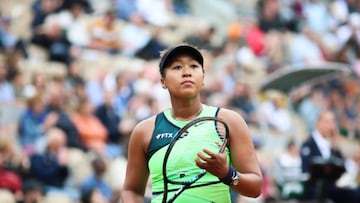Naomi Osaka exits 2022 French Open in first round but is ”okay”
Naomi Osaka, who is not afraid of addressing mental health conversations publicly, exits French Open in first round, but is doing “okay”.

American Amanda Anisimova knocked out 24-year-old Naomi Osaka in one of the marquee French Open first-round matches.
World number 28 Anisimova prevailed 7-5, 6-4 in a rematch of a close third round in this year’s Australian Open, also won by the 20-year-old.
Japanese Osaka, who has fallen to 38th in the world having previously been number one, struggled with her serve and had 29 unforced errors to 13 winners.
Osaka was determined to play in the 2022 French Open
Osaka entered Roland Garros (French Open) short of match preparation on clay, including pulling out from her last tournament with an Achilles injury. The lack of match practice was clear in her defeat to Anisimova, with Osaka constantly missing regulation shots and struggling to gain any consistency.
She told reporters last week, after deciding to do a pre-tournament press conference, that there was no way she could have missed this tournament.
“Of course you kind of have to manage things, but at the same time, I’m going to pop a few painkillers, it is what it is. There is a limited amount of years that I could play tennis, so I have to make the best out of it.”
Osaka was very worried heading to Paris
The four-time major champion (US Open 2018 and 2020, Australian Open 2020 and 2021) showed her vulnerable side once again, adding that she was anxious to get to the tournament.
“For the most part I think I’m OK. When I first came here, I was very worried. … I was worried that there were people that I offended in some way and I would just kind of bump into them. But I think everyone has been really positive, for the most part.”
Osaka withdrew from last French Open due to depression
Following two breaks from tennis last year, Osaka was unseeded for this tournament. She withdrew from the 2021 French Open before her second-round match due to concerns for her mental health. (There are no indications that her loss to Anisimova was down to anything other than tennis.)
At the time she skipped one press conference and refused to attend to reporters, one of the expected duties of players on the tour. Grand Slam organizers threatened to disqualify or suspend the Japanese player.
She took a strong stance on the importance of advocating for mental health issues and in an essay for Time magazine wrote, “it’s ok to not be ok, and it’s ok to not talk about it. I communicated that I wanted to skip press conferences at Roland Garros to exercise self-care and preservation of my mental health. I stand by that. Athletes are humans.”
Subsequently seven-time Olympic medalist Simone Biles showed support for the tennis player.
Simone Biles supports Naomi Osaka
Osaka announced that she suffered “long bouts of depression a day after the warning, and Biles continued to express gratitude for Osaka’s courage. Commenting on it publicly last year, Biles shared that “She (Osaka) is speaking up about mental health, and I think it is really important that athletes put their mental health first… At the end of the day, we are athletes and it is our craft, but we are human too,” explained Biles.
Biles, the most decorated gymnast of all time with 32 Olympic and World Championship medals, pulled out of five of her six finals at the 2020 Olympics, held last summer, to focus on her mental health after suffering from what are known as the ‘twisties’ a phenomenon where the athlete’s spatial awareness is affected during routines.
Importance of mental health awareness in athletes
Thanks in part to what happened to Osaka and Biles, and their willingness to speak up, the importance of mental health among athletes, long an issue that has been ignored or actively dismissed, is now at the forefront of conversations about the challenges facing athletes.
According to Athletes for Hope, a mental health awareness foundation, 35% of elite athletes suffer from mental health issues that may manifest as stress, eating disorders, burnout or depression or anxiety.
Related stories
Thankfully, there has been a rapid increase in both research of mental health issues in athletes and, in some sports at least, an increase in the amount of resources and outreach available for athletes.
If you, or someone you know, is struggling with mental health issues, there are many ways to get help. In the US, the National Institute of Mental Health has a website you can consult.


